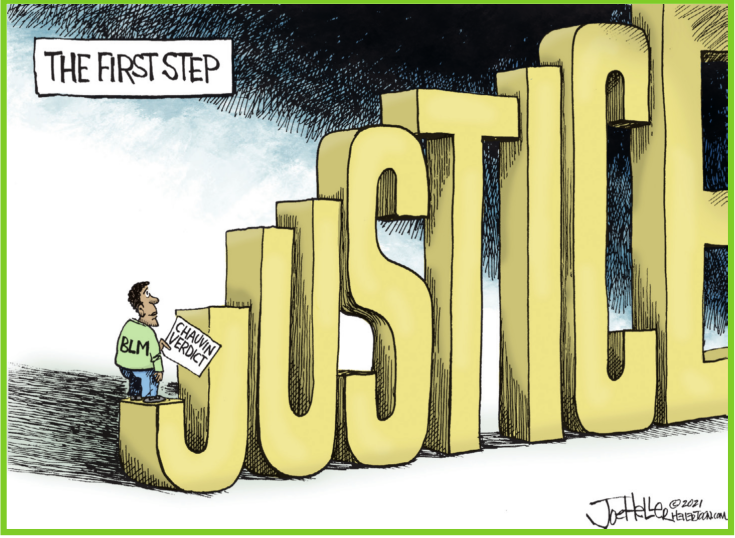While the killer of George Floyd has been convicted, racism has not been eradicated from the legal system
LAW & ORDER
The world watched a white police officer kneel on the neck of George Floyd for 9 minutes and 29 seconds on May 25, 2020. We all watched a murder.
I am a lifelong defense attorney, but I have never shied from using the word “murder” when talking about Mr. Floyd’s death. The technicalities of the law cannot cover what the videotape shows:
This was a murder. While a conviction makes many feel relief or inspires a belief in an appearance of accountability, justice, the prime goal of our legal system, is still elusive. Conviction of the officer that perpetrated the slaughter does not end the oppressive policing and white supremacy inherent in the criminal legal system. In fact, during the pendency of this trial, the police killed as many three other folks of color, including Daunte Wright. As Katie Wright, Daunte Wright’s mother, highlighted, “There’s never going to be justice for us. Justice would bring our son home to us, knocking on the door with his big smile. Coming in the house. Sitting down. Eating dinner with us. Going out to lunch. Playing with his 1, now almost 2-year-old son. Giving him a kiss before he walks out the door. So ‘justice’ isn’t even a word to me.”
Mariame Kaba, an organizer, educator and curator, has said, “indictments won’t and can’t end oppressive policing, which is rooted in anti-Blackness, social control and containment.”
As a trial court clerk, public defender and now post-conviction criminal defense attorney, I have had a front row seat to the violence and injustice perpetuated against Black, Indigenous and other People of Color on a daily basis, but many of the white people in this country do not have this perspective. It is incumbent upon us, as witnesses, to support the people that we know are being harmed and to lift the voices of those that are marginalized.
As evidenced by comments made in the Legislature this session and the governor last month, many in New Hampshire believe that racism does not exist here. Those people are wrong. New Hampshire, as our local Black Lives Matter organizations have highlighted repeatedly, is not innocent. We must listen to the people that have called upon us to reimagine a New Hampshire free from policing, a place where our BIPOC population does not live in fear of any encounter with the arm of the state. One conviction will not accomplish this aim.
We must understand that a conviction is not justice. We must not believe that this conviction means that racism has been eradicated from the criminal legal system. We know that is not true. We must demand something else, something better, something that will provide accountability and safety.
We must think about what it means to say, “Black Lives Matter,” and we must live out those principles. I hope that Mr. Floyd’s family finds some comfort in the verdict, but I also know that this verdict will never return their family to them and can never be enough. Rest in power, Mr. Floyd.
Cynthia Mousseau is a staff attorney at the New England Innocence Project. Before that, she was a public defender in Manchester and Lowell, Mass. This article originally appeared in NH Bar News.
